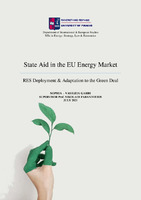State aid in the EU energy market: RES deployment & adaptation to the Green Deal

Master Thesis
Συγγραφέας
Garbi, Sophia - Vasileia
Γαρμπή, Σοφία - Βασιλεία
Ημερομηνία
2021-07Επιβλέπων
Farantouris, NikolaosΦαραντούρης, Νικόλαος
Προβολή/
Λέξεις κλειδιά
Energy law ; State aid ; Competition ; RES ; European Green DealΠερίληψη
With the global population set to continue growing, the demand for energy will steadily increase. Fossil fuel resources are in decline, and their use is associated with environmental destruction. The purpose of this thesis is to highlight the need for
massive RES deployment in order to facilitate the energy transition into a coal free future and achieve complete decarbonisation until 2050. But we all know that RES is a capital intensive business. Since not all RES technologies are mature enough, this
fact reflects on investments since investors tend to be more reluctant towards new forms of RES technologies. This has made financing the RES arguably one of the biggest problems of the 21st century.
During the last years, RES projects were and still are supported throughout EU by support schemes providing security to RES producers, either that comes by FIP regimes or tenders, securing a fixed price on the wholesale market price in order to
make RES more competitive. Since prices for RES infrastructure, establishment and equipment have significantly been reduced, the ultimate goal is that support schemes will eventually cease to exist. But of course we are not there yet. So in order to close
the gap, the granting of state aid is usually inevitable. And as I say, where there is funding (plus in this case state intervention) there is also the need for state aid control. State aid rules are designed to prevent or limit the capacity of Member States to
distort the competitive process and intra-community trade in the EU by granting an undertaking with some economic advantage. The thesis analyzes the role of competition and state aid in the EU energy market, examines all the conditions that
make an aid fall within the scope of Article 107 par.1 of TFEU (notion of state aid) and presents all exceptional frameworks under which a state aid shall be deemed compatible with the EU market. Throughout this thesis it is established that there is a
need for state aid to contribute even more in the energy transition, which raises the question of how the environmental considerations can be integrated into state aid policy.
Last but not least, this thesis also discusses the latest tool of the EU towards tackling energy and climate crisis, which is the EU Green Deal, and its correlation with the state aid regime. It also discusses how the current guidelines (EEAG) allow to be
broadened in order to promote coherency with the EU Green Deal objectives. As long as state aid is granted on an absolutely necessary basis with the goal of phasing out subsidies once all negative externalities have been internalized, then the distortion of
competition would be kept to a minimum and the market failure linked to negative externalities rectified.


